
Hagia Sophia, officially the Hagia Sophia Grand Mosque,(Turkish: Ayasofya-i Kebir Cami-i Şerifi; Greek: Μεγάλο Τζαμί της Αγίας Σοφίας), is a mosque and former church serving as a major cultural and historical site in Istanbul, Turkey. The last of three church buildings to be successively erected on the site by the Eastern Roman Empire, it was completed in AD 537, becoming the world's largest interior space and among the first to employ a fully pendentive dome. It is considered the epitome of Byzantine architecture and is said to have "changed the history of architecture". The site was an Eastern rite church from AD 360 to 1453, except for a brief time as a Latin Catholic church between the Fourth Crusade in 1204 and 1261. After the fall of Constantinople in 1453, it served as a mosque until 1935, when it became a museum, until being redesignated as a mosque in 2020.

The Blue Mosque, officially the Sultan Ahmed Mosque, is an Ottoman-era historical imperial mosque located in Istanbul, Turkey. It was constructed between 1609 and 1617 during the rule of Ahmed I and remains a functioning mosque today. It also attracts a large number of tourists and is one of the most iconic and popular monuments of Ottoman architecture.

The Prophet's Mosque is the second mosque built by the Islamic prophet Muhammad in Medina, after the Quba Mosque, as well as the second largest mosque and holiest site in Islam, after the Masjid al-Haram in Mecca, in the Saudi region of the Hejaz. The mosque is located at the heart of Medina, and is a major site of pilgrimage that falls under the purview of the Custodian of the Two Holy Mosques.

The Süleymaniye Mosque is an Ottoman imperial mosque located on the Third Hill of Istanbul, Turkey. The mosque was commissioned by Suleiman the Magnificent and designed by the imperial architect Mimar Sinan. An inscription specifies the foundation date as 1550 and the inauguration date as 1557, although work on the complex probably continued for a few years after this.

Kastamonu, formerly Kastamone/Castamone and Kastamon/Castamon, is a city in northern Turkey. It is the seat of Kastamonu Province and Kastamonu District. Its population is 125,622 (2021). The city lies at an elevation of 904 m (2,966 ft). It is located in the southern part of the province.

The Bayezid II Mosque is an early 16th-century Ottoman imperial mosque located in Beyazıt Square in Istanbul, Turkey, near the ruins of the Forum of Theodosius of ancient Constantinople.

Mudurnu is a small town in Bolu Province in the Black Sea region of Turkey, 52 km south-west of the city of Bolu. It is the seat of Mudurnu District. Its population is 5,379 (2021). The mayor is Necdet Türker (MHP), elected in 2019.

Uzunköprü is a town in Edirne Province in Turkey. It is named after a historical stone bridge, claimed to be the world's longest, on the Ergene River. It is a strategically important border town, located on the routes connecting Turkey to the Balkans and Europe. It is the seat of Uzunköprü District. Its population is 39,577 (2022). Uzunköprü is the third most populous town of Edirne Province.

The Şehzade Mosque is a 16th-century Ottoman imperial mosque located in the district of Fatih, on the third hill of Istanbul, Turkey. It was commissioned by Suleiman the Magnificent as a memorial to his son Şehzade Mehmed who died in 1543. It is sometimes referred to as the "Prince's Mosque" in English. The mosque was one of the earliest and most important works of architect Mimar Sinan and is one of the signature works of Classical Ottoman architecture.

Sokollu Mehmed Pasha Mosque is a 16th-century Ottoman mosque in the Kadırga neighborhood in Fatih district, Istanbul, Turkey. It was commissioned jointly by the grand vizier Sokollu Mehmed Pasha and his wife İsmihan Sultan. It was designed by the imperial architect Mimar Sinan and completed in 1571/2. The mosque is noted for the fine quality of the Iznik tiles that decorate the interior walls.
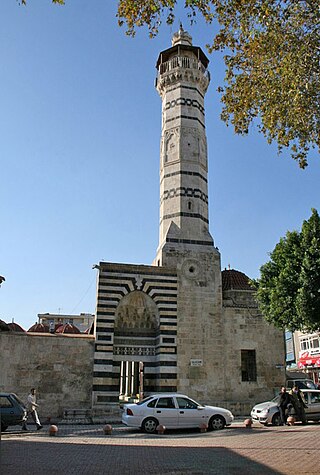
The Great Mosque of Adana, also known as the Ramazanoglu Mosque, is a mosque from the 16th century in Adana, Turkey. It forms part of a complex (külliye) that includes a madrasah and a mausoleum (türbe). The complex is on Kızılay Street, next to the Ramazanoğlu Hall.
The 1943 Tosya–Ladik earthquake occurred at 01:20 local time on 27 November, near Tosya, Kastamonu Province, in northern Turkey. The earthquake had an estimated moment magnitude of 7.5–7.7 and a maximum felt intensity of XI (Catastrophic) on the MSK-64 scale. Its effects were observed for over 45,000 km2. The earthquake was felt in Trabzon, Isparta, Elazığ, Zonguldak and Yozgat. Damage was seen in Kastamonu, Çankırı, Çorum, Amasya, Samsun, Tokat, Sinop and Ordu. As a result of the earthquake, more than 2,500 were killed and 5,000 were injured.

The Sinan Pasha Mosque is an Ottoman-era mosque in the city of Prizren, Kosovo built by the Albanian pasha Sofi Sinan in 1615. The mosque overlooks the main street of Prizren and is a dominant feature in the town's skyline.
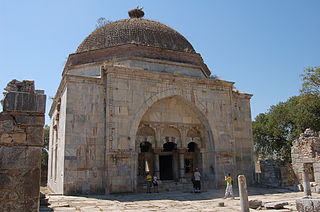
İlyas Bey Mosque is a historical Islamic religious building at Milet in Didim district of Aydın Province, western Turkey. It was built in 1403 by Ilyas Bey (1402–1421), ruler of the Turkish Menteshe emirate.
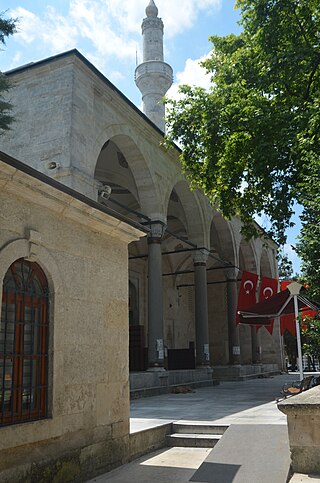
Piri Mehmed Pasha Mosque is an Ottoman-era mosque in Silivri, Istanbul Province, Turkey, built in 1530–31 by Grand vizier Piri Mehmed Pasha.

Nasrullah Bridge, also known locally as the Hunchback Bridge, is a 16th-century stone arch bridge in Kastamonu, Turkey.
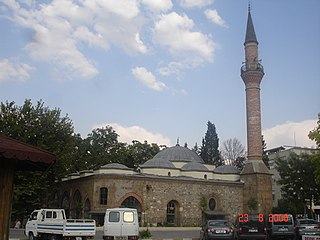
Uşak Grand Mosque is a historic mosque in Uşak City, Uşak Province, Turkey.

The Murat Pasha Mosque is a 15th century Ottoman mosque squeezed in between two busy roads linking Aksaray and Yusufpaşa in the Fatih district of Istanbul, Turkey.

The Aladža Mosque, also known as Šarena džamija, "Colorful Mosque", is an Ottoman era mosque that was built in 1549 and located in Foča, Bosnia and Herzegovina. It is considered one of the most beautiful and important examples of Ottoman architecture in Europe, and is one of the most important Ottoman era mosques in all of Bosnia and Herzegovina; along with the Gazi Husrev-beg Mosque in Sarajevo and the Ferhadija Mosque in Banja Luka. It was completely destroyed with pre-planted explovises at the beginning of the Bosnian War in 1992 by the VRS, and levelled to the ground; along with the left over stones and rubble from the mosque being hidden all over Foča to prevent its reconstruction. After many years of searching for the stones once the Bosniak refugees of Foča began to return, and sourcing the funds necessary for the reconstruction of the mosque, its reconstruction was started in 2016, and completed in 2018.
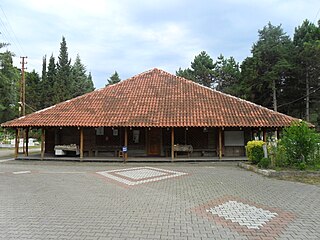
Göğceli Mosque is a historic log mosque situated inside the Göğceli Cemetery in Çarşamba, Samsun, northern Turkey. Built during the Seljuk Empire period in the 13th century, the log mosque was constructed without the use of nails.




















